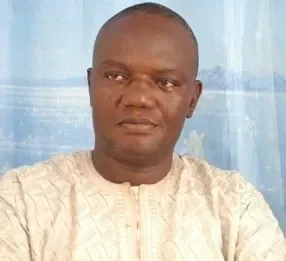By Abraham Ogbodo
Finally, President Mohammadu Buhari died on July 13, 2025. He wasn’t quite the coward alluded to by William Shakespeare in Julius Caeser. But he had died many times before his real death last Sunday.
In the build-up to the 2015 presidential election, the state of his health was about the only campaign issue in the opposing camp. Senate President, Godswill Akpabio, then a pretentious promoter of President Goodluck Jonathan, had expressed deep worries. He said his own mother who was of the same age as Buhari, was suffering various forms of age-induced incapacitation and that Buhari, as President, would not be different. He advised voters to be properly guided and avoid the impending burden that was Buhari. Ayo Fayose had also warned, in a like tone, and applying a similar analogy.
But Buhari happened in spite of all the warnings. The point about his ill health was not in anyway, minimized. It was manifest and remained a major talking point in political discourse for the eight years that Buhari reoccupied the presidency. He was dying almost every day. His obituary was announced at will by social media content creators. A video of his burial attended by known people was actually created and circulated widely. To make the conspiracy, water-tight, a certain Jibril from Sudan, an alleged Buhari look-alike, was invented to keep the Presidency occupied by a Buhari after the burial of the real Buhari.
The narrative was so forcefully that even the mainstream media got tempted. I remember as Editor of The Guardian, of being pointedly asked on set by one of the anchors of Channels Television early morning show, if I believed Buhari was dead or alive? No true Moslem dies hidden. Even now, conspiracy theories are still being spun to detract from the reality of his death. Something still maintained he died in 2017 and his dying again in 2025 was to bring his recurring death to a realistic closure.
All said, his clinical death wasn’t as much the issue as his leadership death. Nigerians did not have a president in him. In the build-up, he was fraudulently hyped for high performance. Rising up to his projected prowess, became a fundamental challenge all through. The capacity to act was neither manifest nor latent in him. He only felt he could abuse further his privileges.
Buhari started his military career at age 23 years. At 40 years in 1983, and in just 17 years of service, he had cheated all the odds to become a full general and Head of State and Commander-In-Chief of the Armed Forces of the Federal Republic of Nigeria. He was forced out at 42. He returned some time in the 90s, first, under late former Head of State, Gen. Sani Abacha as chairman of the cash-soaked Petroleum Trust Fund (PTF) and later in 2015, as a democratically elected President. He stayed till 2023 and died in 2025, two years after leaving office as President.
The trajectory shows a privileged life that was lived at the expense of the public treasury. But the hollowness in that life was even more pronounced. The controversy around Buhari, even at death, is occasioned by the difficulty that bookmakers are experiencing in balancing his long public service life with the quantum of good that entered the public space through him. The math has persistently failed to add up. As he was in the beginning, so he remained unto death. The few, including Prof Pat Utomi, who genuinely believed in him, were taken for a ride.
My article on Buhari on June 18, 2017 in The Guardian reads as if it is written tomorrow. It is titled: Buhari: The Making Of A Tragic Hero. It is reproduced hereunder, with minor touches, to prove that Buhari had been an unchanging factor in leadership deficiency.
“The Aristotelian perspective defines the tragic hero as being complete in all the indices of greatness, but lacking in an essential character trait that makes all the difference. This is called the tragic flaw in literary theory and criticism. But for this tiny character failure, which occasions the tragedy, the tragic hero will have arrived safely at destination in the great journey called life.
This was when tragedy was defined as the exclusive experience of kings and princes. That definition changed with the advent of the 20th Century American playwright and essayist, Arthur Miller, who made everyman (not only noble men) a tragic hero. He said since “tragedy is the consequence of a man’s total compulsion to evaluate himself justly,” the common man could also experience tragedy as much as the king or prince. He eloquently proved this point in The Death Of A Salesman, and in his other works, to hack down the foundations of Aristotle’s Poetics.
In both definitions, something is central, which is the quest of man to attain perfection in spite of his limitations. The very nature of man places a limitation on him and what creates the tragic circumstances is the refusal of man to appreciate his own limitation. Perhaps, it would mark the end of time and beginning of God’s kingdom, the day man overcomes this innate limitation and obliterates the basis for tragic narratives.
This is very true of President Muhammadu Buhari, who has been yearning to build a great Nigeria since 1983 without appreciation of his limitation. The other thing about the tragic hero is that his flaw is hidden from him but revealed to his audience. Nobody however, is able to deliver help because the tragedy, which the hero must live through, has been divinely programmed. Even so, I am tempted to keep God out of this so that fatalism or determinism is not made to replace existentialism and absolve man of culpability in the actions and inactions that occasion the tragedy.
Man is still the architect of his fate. Put differently, God has no hands in the flaws that today separate Buhari from accomplishment, much as he tries to drive the variables to a specific purpose. His, is even unusual. Whereas in classic tragedy, the hero is often pinned down to just a flaw, Buhari is almost boundless in flaws. As a character, Buhari does not yield to easy description. His motivations are complex. One does not easily understand when he is working for Nigeria and when he is working against Nigeria or working for himself or a smaller group within the national scheme. Prior to his grand re-entering in 2015, he had been declared by a quasi-national consensus to be pure in character. Supported by a highly efficient propaganda machinery, this position became unassailable. Not even the legendary Professor Wole Soyinka, with all he knows about reality and perception, could deconstruct the façade to bring out a deeper truth. He, too, was part of the cheering audience.
In pleading his return, Prof. Soyinka had dropped a memorable line. He said the intervening years, precisely between 1985 and 2015, had done something about Gen. Muhammadu Buhari, and that the memories of his (Buhari) first life 30 years ago, would not apply in his reincarnation. Coming from the Nobel Laureate, the proposition was good to take to the bank. Many Nigerians did, except Buhari himself, who, like a snake, only changed skin without changing character. He transited from khaki to babariga but retained the essentials. The wine in him is getting better with age. This can be counted as his first flaw along the tragic path. That is, his blunt refusal to take Professor Soyinka seriously. He does not have a listening ear. And because he never listens, he hears nothing new and learns nothing new. He is fixated on methods and concepts and somehow genuinely thinks that Nigeria cannot be larger than the Sokoto Caliphate.
Flowing from this is the burning desire in Buhari to express power instead of authority in leadership. Power is crude and inflicts pains. It is unsustainable outside coercion. Authority is refined, inspiring and sustainable. Besides, power is fired by hate, intolerance, vengeance, selfishness and pride. It is about the only instrument in totalitarian regimes and because it suffers constant resistance, it aligns almost always with propaganda to communicate leadership to the people. On the other hand, authority is consensual, collaborative, builds and operates on love and requires no extra effort or help to communicate effective leadership to the people. Leaders who express authority instead of power protect the common heritage against hijackers.
Under Buhari, there has been a preponderance of power, which is why there is so much vocal effort by Lai Mohammed and others to communicate Buhari’s leadership to the Nigerian people. People see anger and vengeance instead of leadership. Whereas it is legitimate for leaders to be angry about the objective social conditions and seek to make things better, it is dangerous when leadership anger is tailored at vengeance and settling of personal scores.
Nelson Mandela, for instance, left the Robben Island prison on February 11, 1990 very angry, and hungry for political power in the evolving configuration in Pretoria, to make a bold statement. But he never planned to seize leadership for the very narrow purpose of settling scores with his Boer jailers. He left vengeful anger behind in his prison cell and sought to move South Africa beyond the discriminations of apartheid to a Rainbow Nation where the freedoms of all groups would be guaranteed. As it turned, his factor alone saved post-apartheid South Africa from a civil war. He didn’t need more than this to earn his place as a world hero, not tragic hero.
Enough to say that leadership is more spiritual than it is intellectual. What manifested regarding the Madiba was a spirituality that took the entire humanity as a constituency even as the man fought back the intellect that pushed for vengeance against the background of the daunting memories of his incarceration by the Apartheid regime. You can call this the leadership spirit, which flows in good measures in all leaders that withstand the untainted judgment of history. And I feel free to say that what defines a man is a spirit that connects effortlessly with God’s purpose and not a huge intellect which could also be called ego that is forever seeking to rationalise and justify hatred and every bad conduct.
Buhari neither has a huge intellect nor an elevated spirit. He is focused on an ideology that is propelled by a very narrow purpose. This is the foundation of his tragedy. As said, the tragic hero is helpless. He is simply himself and cannot possibly overreach himself in trying to achieve a higher purpose. His intentions are pure but that is in direct proportion to the purity of his spirit. His best efforts are challenged by what he may term inexplicable cosmic interventions, but which his audience understands as his flaws. Everyone, except the hero, sees the glaring flaws.
So it is today with Buhari. He is a great man doing everything to make a great point about leadership but nothing is adding up. Yet he is not able to fix what is wrong because it is not part of the privileges of tragic heroes to understand their flaws while still on stage. But who knows, Buhari may change in the real sense of the word and refract his fate. Otherwise, the rest of us can only pray for him to survive to sit among the audience and witness a postmortem at the end of the ongoing tragic performance.”
The prayer was answered. Buhari did witness the postmortem for well over 24 months. He had heard, loud and clear, the verdict of the grand jury. Nothing will be added or subtracted to overstate or understate the epitaph. This is it: “Here lies General Mohammadu Buhari who used every great opportunity to add nothing.”























